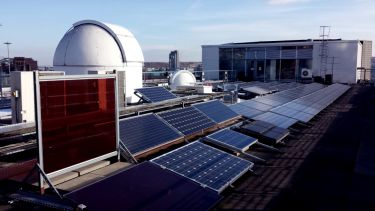- The University of Sheffield pledges to be carbon neutral on campus by 2030 and across all its activities by 2038, as part of its sustainability strategy
- Vice-Chancellor calls for the institution to become “one of the most sustainable research-intensive universities in the country”
- Following student demand, sustainability strategy pledges to embed Education for Sustainable Development into all taught courses
- University plans to use leading research capability to tackle climate change and other sustainability challenges locally, regionally and nationally
Beyond its campus, the University is also connecting its research and teaching to sustainability challenges and net zero ambitions. Working with its partners, the University aims to support the Sheffield City Region to become a national leader in sustainability.
The University of Sheffield has today (Tuesday 10 November) pledged to reach net-zero carbon emissions on campus by 2030 and across all activities by 2038, placing it among a small number of institutions that have committed to this level of transformational action in response to the climate emergency.
These commitments, set out in its new five-year sustainability strategy, are informed by its academics’ research, the Intergovernmental Panel on Climate Change’s (IPCC) call for comprehensive climate action and the Tyndall Centre’s 2019 report, ‘Setting Climate Commitments for the City of Sheffield’.
The strategy is the latest step in the University of Sheffield’s sustainability journey, in which its students have played a key role. Working with University staff to embed sustainable changes across the institution, students are involved at every stage, ensuring this new sustainability strategy reflects their priorities and ambitions. Earlier this year, student representatives played a key role alongside staff in the University’s decision to switch procured campus electricity to a renewable supplier, Bryt Energy, ensuring that 100 per cent of procured electricity on campus will come from wind, solar and hydro sources.
Following the University’s 2019 announcement that it had fully divested its endowment from fossil fuel investments and between 2005-2019, cut its carbon emissions by 35 per cent, the new sustainability strategy takes these commitments further; including pledges to embed Education for Sustainable Development into all taught courses, maintain a 100 per cent renewable procured electricity supply and tackling high carbon travel practices.
The strategy summarises the University’s thinking on research and innovation, education, campus and city region sustainability challenges. In bringing together this work, sustainability leads have drawn upon the whole University community from student climate campaigners to senior academics. Both academic staff and students continue to engage cooperatively to map out the University’s path to net-zero.
President and Vice-Chancellor Professor Koen Lamberts, said: “The world is facing a climate emergency and universities are uniquely placed to respond to the global challenges that we face.
“The challenges we face are multifaceted and any action we take to overcome them requires a careful balance between environmental, economic and social factors to understand their full impact. But we will never lose sight of the urgent need to cut emissions, restore habitats and secure our planet for the future.”
“We aim to become one of the most sustainable research-intensive universities in the country by aligning our research, teaching and campus to ensure sustainable practice across everything we do. We will become net carbon neutral on campus by 2030 and across all activities by 2038.
President and Vice-Chancellor Professor Koen Lamberts
Dr Rachael Rothman, Co-Director of the Grantham Centre for Sustainable Futures and Academic Lead for Sustainability, added: “The science is showing us that bold and decisive action is needed to combat the climate emergency. As highlighted by the IPCC, the next ten years will be crucial. At Sheffield, we are stepping up to the challenge by setting ourselves ambitious but achievable targets for emissions reductions.
“This new sustainability strategy is a truly unique collaboration between our student body and our world leading sustainability research. This document is the culmination of many years of work by students and staff in a number of areas. I would like to thank all of those who have played a role in its development.
“Underpinning our strategy, lies an action plan which will ensure that we are being transparent by showing how we aim to achieve our ambitious targets. We will be providing regular updates to ensure we are making progress towards our targets and continually assessing that our strategy remains in line with the science.”
Jordan Weir, University of Sheffield Students’ Union Development Officer and Student Lead for Sustainability, said: “This strategy is a tribute to the years of constructive campaigning that students at Sheffield have undertaken. I am delighted that the University has committed to targeting a net-zero campus by 2030.
“This shows the University is willing to listen to climate science and student campaigners in its sustainability activities. I look forward to working with University and Students' Union colleagues to achieve our collective goals.”

